Analyzing Problems of MNCs in Overseas Business Expansion: A Report
VerifiedAdded on 2022/11/29
|13
|2860
|256
Report
AI Summary
This report delves into the challenges faced by multinational corporations (MNCs) when expanding their businesses into subsidiary countries. It begins with a case study of six US-based MNCs operating in Japan from 1993 to 1994, highlighting their struggles to compete with local companies and navigate cultural differences. The report then introduces Hofstede's Cultural Dimensions Theory as a framework for understanding cultural variations and their impact on business operations. It emphasizes the importance of national culture, including variables such as religion, language, and customs, for organizational leaders like Tesco, particularly in the context of expanding into China. The report identifies challenges such as market access, bureaucracy, and governmental issues, and proposes solutions like forming partnerships and negotiating with the state. The peer review form assesses the clarity, understanding, and thinking demonstrated in the analysis. The report concludes with a summary of the key findings and provides references to supporting literature.

Individual poster and summary
Paraphrase This Document
Need a fresh take? Get an instant paraphrase of this document with our AI Paraphraser

Table of Contents
REFRENCES.............................................................................................................................6
Summary....................................................................................................................................9
Peer Review Form....................................................................................................................10
Article review sheet..................................................................................................................12
REFRENCES...........................................................................................................................14
REFRENCES.............................................................................................................................6
Summary....................................................................................................................................9
Peer Review Form....................................................................................................................10
Article review sheet..................................................................................................................12
REFRENCES...........................................................................................................................14
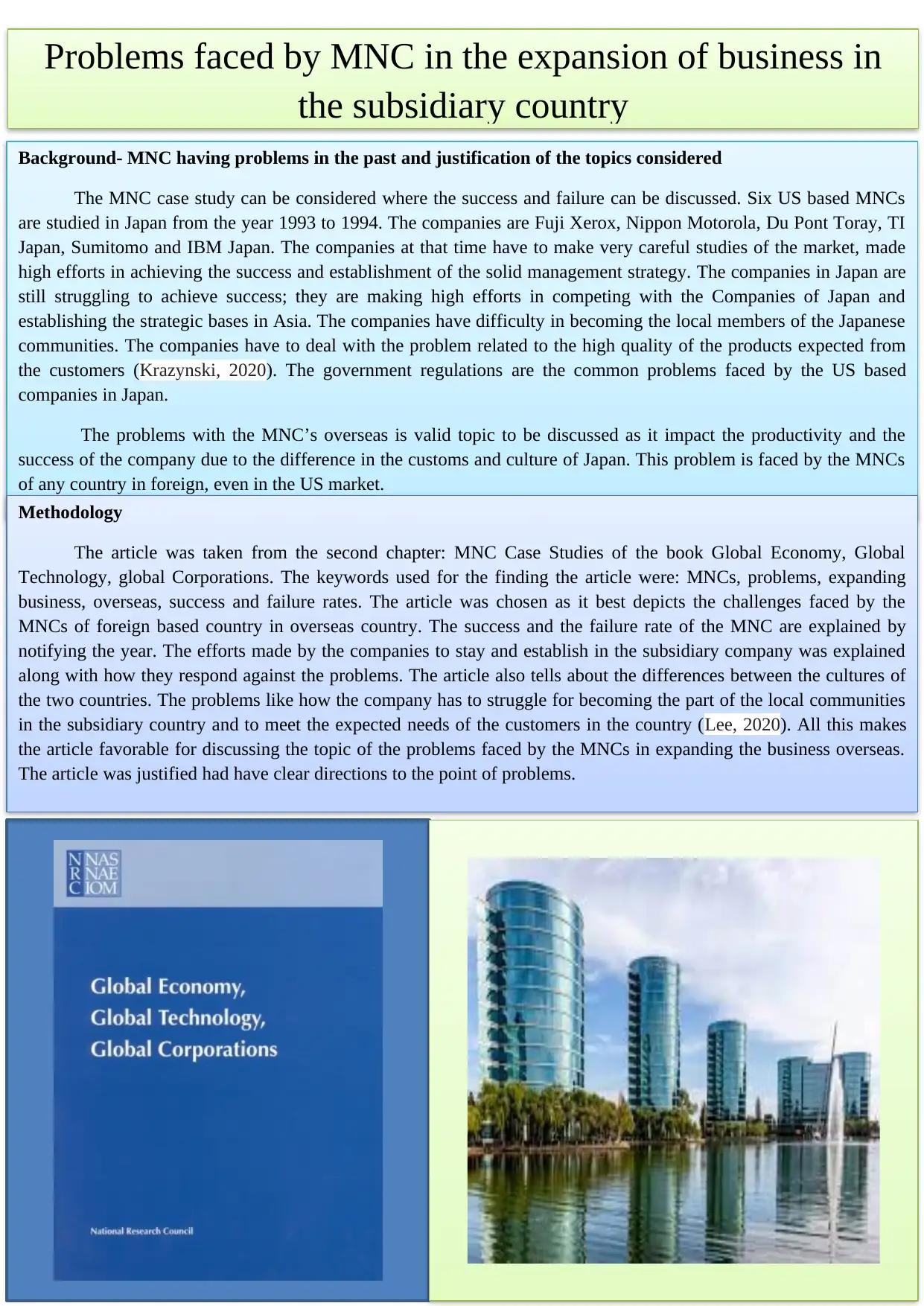
Problems faced by MNC in the expansion of business in
the subsidiary country
Background- MNC having problems in the past and justification of the topics considered
The MNC case study can be considered where the success and failure can be discussed. Six US based MNCs
are studied in Japan from the year 1993 to 1994. The companies are Fuji Xerox, Nippon Motorola, Du Pont Toray, TI
Japan, Sumitomo and IBM Japan. The companies at that time have to make very careful studies of the market, made
high efforts in achieving the success and establishment of the solid management strategy. The companies in Japan are
still struggling to achieve success; they are making high efforts in competing with the Companies of Japan and
establishing the strategic bases in Asia. The companies have difficulty in becoming the local members of the Japanese
communities. The companies have to deal with the problem related to the high quality of the products expected from
the customers (Krazynski, 2020). The government regulations are the common problems faced by the US based
companies in Japan.
The problems with the MNC’s overseas is valid topic to be discussed as it impact the productivity and the
success of the company due to the difference in the customs and culture of Japan. This problem is faced by the MNCs
of any country in foreign, even in the US market.
Methodology
The article was taken from the second chapter: MNC Case Studies of the book Global Economy, Global
Technology, global Corporations. The keywords used for the finding the article were: MNCs, problems, expanding
business, overseas, success and failure rates. The article was chosen as it best depicts the challenges faced by the
MNCs of foreign based country in overseas country. The success and the failure rate of the MNC are explained by
notifying the year. The efforts made by the companies to stay and establish in the subsidiary company was explained
along with how they respond against the problems. The article also tells about the differences between the cultures of
the two countries. The problems like how the company has to struggle for becoming the part of the local communities
in the subsidiary country and to meet the expected needs of the customers in the country (Lee, 2020). All this makes
the article favorable for discussing the topic of the problems faced by the MNCs in expanding the business overseas.
The article was justified had have clear directions to the point of problems.
the subsidiary country
Background- MNC having problems in the past and justification of the topics considered
The MNC case study can be considered where the success and failure can be discussed. Six US based MNCs
are studied in Japan from the year 1993 to 1994. The companies are Fuji Xerox, Nippon Motorola, Du Pont Toray, TI
Japan, Sumitomo and IBM Japan. The companies at that time have to make very careful studies of the market, made
high efforts in achieving the success and establishment of the solid management strategy. The companies in Japan are
still struggling to achieve success; they are making high efforts in competing with the Companies of Japan and
establishing the strategic bases in Asia. The companies have difficulty in becoming the local members of the Japanese
communities. The companies have to deal with the problem related to the high quality of the products expected from
the customers (Krazynski, 2020). The government regulations are the common problems faced by the US based
companies in Japan.
The problems with the MNC’s overseas is valid topic to be discussed as it impact the productivity and the
success of the company due to the difference in the customs and culture of Japan. This problem is faced by the MNCs
of any country in foreign, even in the US market.
Methodology
The article was taken from the second chapter: MNC Case Studies of the book Global Economy, Global
Technology, global Corporations. The keywords used for the finding the article were: MNCs, problems, expanding
business, overseas, success and failure rates. The article was chosen as it best depicts the challenges faced by the
MNCs of foreign based country in overseas country. The success and the failure rate of the MNC are explained by
notifying the year. The efforts made by the companies to stay and establish in the subsidiary company was explained
along with how they respond against the problems. The article also tells about the differences between the cultures of
the two countries. The problems like how the company has to struggle for becoming the part of the local communities
in the subsidiary country and to meet the expected needs of the customers in the country (Lee, 2020). All this makes
the article favorable for discussing the topic of the problems faced by the MNCs in expanding the business overseas.
The article was justified had have clear directions to the point of problems.
⊘ This is a preview!⊘
Do you want full access?
Subscribe today to unlock all pages.

Trusted by 1+ million students worldwide
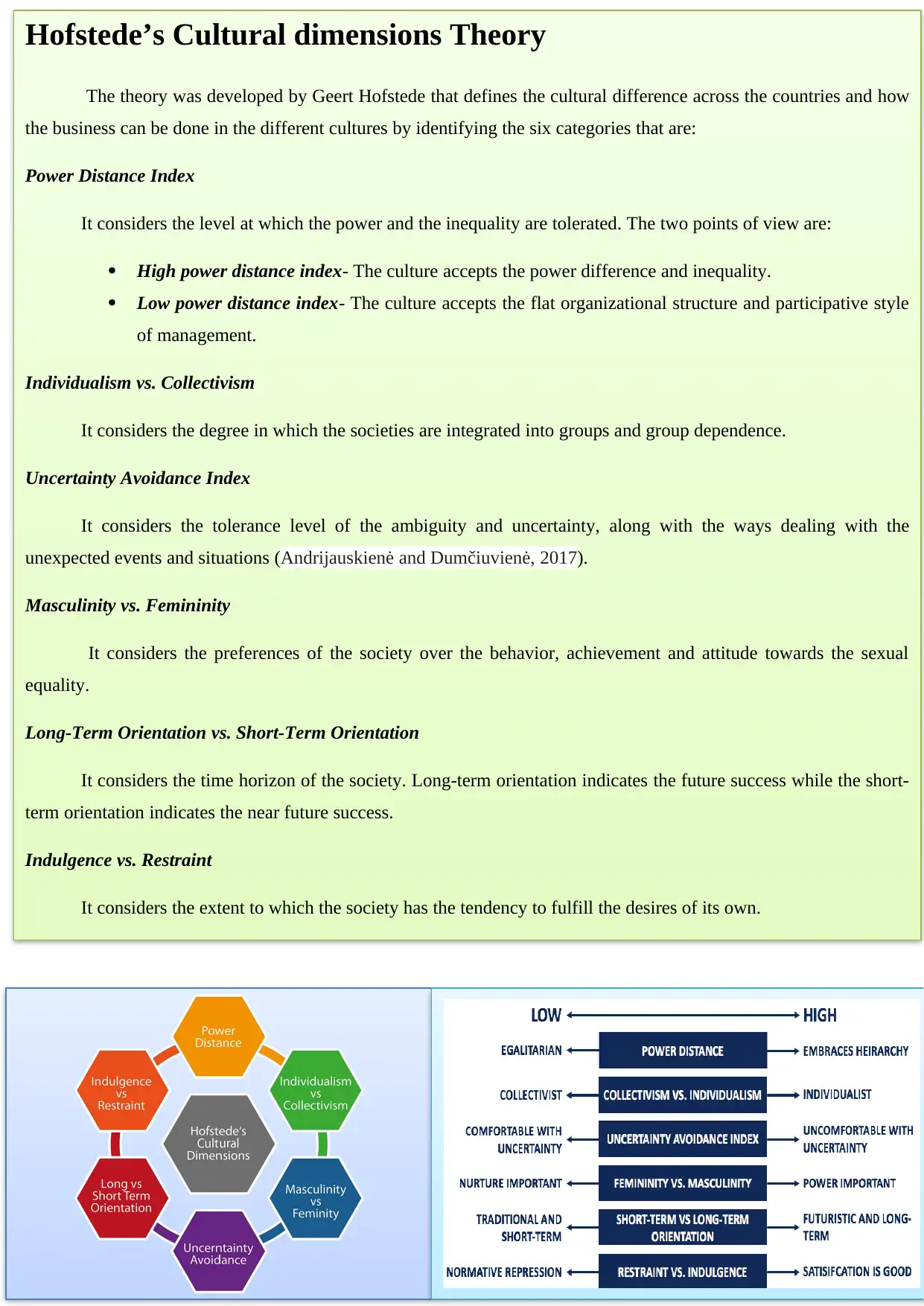
Hofstede’s Cultural dimensions Theory
The theory was developed by Geert Hofstede that defines the cultural difference across the countries and how
the business can be done in the different cultures by identifying the six categories that are:
Power Distance Index
It considers the level at which the power and the inequality are tolerated. The two points of view are:
High power distance index- The culture accepts the power difference and inequality.
Low power distance index- The culture accepts the flat organizational structure and participative style
of management.
Individualism vs. Collectivism
It considers the degree in which the societies are integrated into groups and group dependence.
Uncertainty Avoidance Index
It considers the tolerance level of the ambiguity and uncertainty, along with the ways dealing with the
unexpected events and situations (Andrijauskienė and Dumčiuvienė, 2017).
Masculinity vs. Femininity
It considers the preferences of the society over the behavior, achievement and attitude towards the sexual
equality.
Long-Term Orientation vs. Short-Term Orientation
It considers the time horizon of the society. Long-term orientation indicates the future success while the short-
term orientation indicates the near future success.
Indulgence vs. Restraint
It considers the extent to which the society has the tendency to fulfill the desires of its own.
The theory was developed by Geert Hofstede that defines the cultural difference across the countries and how
the business can be done in the different cultures by identifying the six categories that are:
Power Distance Index
It considers the level at which the power and the inequality are tolerated. The two points of view are:
High power distance index- The culture accepts the power difference and inequality.
Low power distance index- The culture accepts the flat organizational structure and participative style
of management.
Individualism vs. Collectivism
It considers the degree in which the societies are integrated into groups and group dependence.
Uncertainty Avoidance Index
It considers the tolerance level of the ambiguity and uncertainty, along with the ways dealing with the
unexpected events and situations (Andrijauskienė and Dumčiuvienė, 2017).
Masculinity vs. Femininity
It considers the preferences of the society over the behavior, achievement and attitude towards the sexual
equality.
Long-Term Orientation vs. Short-Term Orientation
It considers the time horizon of the society. Long-term orientation indicates the future success while the short-
term orientation indicates the near future success.
Indulgence vs. Restraint
It considers the extent to which the society has the tendency to fulfill the desires of its own.
Paraphrase This Document
Need a fresh take? Get an instant paraphrase of this document with our AI Paraphraser
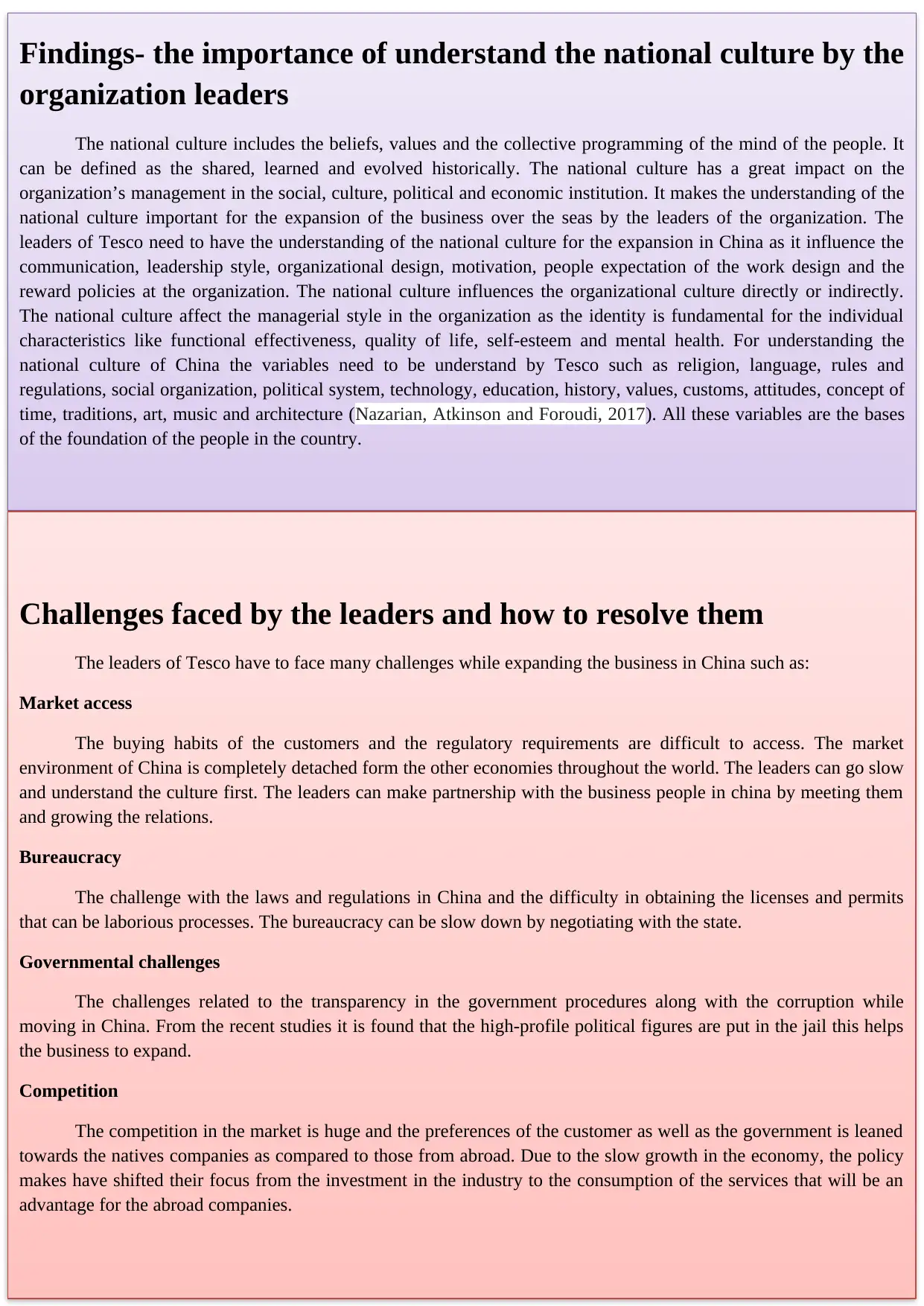
Findings- the importance of understand the national culture by the
organization leaders
The national culture includes the beliefs, values and the collective programming of the mind of the people. It
can be defined as the shared, learned and evolved historically. The national culture has a great impact on the
organization’s management in the social, culture, political and economic institution. It makes the understanding of the
national culture important for the expansion of the business over the seas by the leaders of the organization. The
leaders of Tesco need to have the understanding of the national culture for the expansion in China as it influence the
communication, leadership style, organizational design, motivation, people expectation of the work design and the
reward policies at the organization. The national culture influences the organizational culture directly or indirectly.
The national culture affect the managerial style in the organization as the identity is fundamental for the individual
characteristics like functional effectiveness, quality of life, self-esteem and mental health. For understanding the
national culture of China the variables need to be understand by Tesco such as religion, language, rules and
regulations, social organization, political system, technology, education, history, values, customs, attitudes, concept of
time, traditions, art, music and architecture (Nazarian, Atkinson and Foroudi, 2017). All these variables are the bases
of the foundation of the people in the country.
Challenges faced by the leaders and how to resolve them
The leaders of Tesco have to face many challenges while expanding the business in China such as:
Market access
The buying habits of the customers and the regulatory requirements are difficult to access. The market
environment of China is completely detached form the other economies throughout the world. The leaders can go slow
and understand the culture first. The leaders can make partnership with the business people in china by meeting them
and growing the relations.
Bureaucracy
The challenge with the laws and regulations in China and the difficulty in obtaining the licenses and permits
that can be laborious processes. The bureaucracy can be slow down by negotiating with the state.
Governmental challenges
The challenges related to the transparency in the government procedures along with the corruption while
moving in China. From the recent studies it is found that the high-profile political figures are put in the jail this helps
the business to expand.
Competition
The competition in the market is huge and the preferences of the customer as well as the government is leaned
towards the natives companies as compared to those from abroad. Due to the slow growth in the economy, the policy
makes have shifted their focus from the investment in the industry to the consumption of the services that will be an
advantage for the abroad companies.
organization leaders
The national culture includes the beliefs, values and the collective programming of the mind of the people. It
can be defined as the shared, learned and evolved historically. The national culture has a great impact on the
organization’s management in the social, culture, political and economic institution. It makes the understanding of the
national culture important for the expansion of the business over the seas by the leaders of the organization. The
leaders of Tesco need to have the understanding of the national culture for the expansion in China as it influence the
communication, leadership style, organizational design, motivation, people expectation of the work design and the
reward policies at the organization. The national culture influences the organizational culture directly or indirectly.
The national culture affect the managerial style in the organization as the identity is fundamental for the individual
characteristics like functional effectiveness, quality of life, self-esteem and mental health. For understanding the
national culture of China the variables need to be understand by Tesco such as religion, language, rules and
regulations, social organization, political system, technology, education, history, values, customs, attitudes, concept of
time, traditions, art, music and architecture (Nazarian, Atkinson and Foroudi, 2017). All these variables are the bases
of the foundation of the people in the country.
Challenges faced by the leaders and how to resolve them
The leaders of Tesco have to face many challenges while expanding the business in China such as:
Market access
The buying habits of the customers and the regulatory requirements are difficult to access. The market
environment of China is completely detached form the other economies throughout the world. The leaders can go slow
and understand the culture first. The leaders can make partnership with the business people in china by meeting them
and growing the relations.
Bureaucracy
The challenge with the laws and regulations in China and the difficulty in obtaining the licenses and permits
that can be laborious processes. The bureaucracy can be slow down by negotiating with the state.
Governmental challenges
The challenges related to the transparency in the government procedures along with the corruption while
moving in China. From the recent studies it is found that the high-profile political figures are put in the jail this helps
the business to expand.
Competition
The competition in the market is huge and the preferences of the customer as well as the government is leaned
towards the natives companies as compared to those from abroad. Due to the slow growth in the economy, the policy
makes have shifted their focus from the investment in the industry to the consumption of the services that will be an
advantage for the abroad companies.

REFRENCES
Krazynski, 2020. Aldi’s International Expansion–Past and Present.
Horbach and Halffman, 2018. The changing forms and expectations of peer review. Research integrity and peer
review. 3(1). pp.1-15.
Nazarian, Atkinson and Foroudi, 2017. Influence of national culture and balanced organizational culture on the hotel
industry’s performance. International Journal of Hospitality Management. 63. pp.22-32.
Andrijauskienė and Dumčiuvienė, 2017, October. Hofstede’s cultural dimensions and national innovation level.
In DIEM: Dubrovnik International Economic Meeting (Vol. 3, No. 1, pp. 189-205). Sveučilište u Dubrovniku
Krazynski, 2020. Aldi’s International Expansion–Past and Present.
Horbach and Halffman, 2018. The changing forms and expectations of peer review. Research integrity and peer
review. 3(1). pp.1-15.
Nazarian, Atkinson and Foroudi, 2017. Influence of national culture and balanced organizational culture on the hotel
industry’s performance. International Journal of Hospitality Management. 63. pp.22-32.
Andrijauskienė and Dumčiuvienė, 2017, October. Hofstede’s cultural dimensions and national innovation level.
In DIEM: Dubrovnik International Economic Meeting (Vol. 3, No. 1, pp. 189-205). Sveučilište u Dubrovniku
⊘ This is a preview!⊘
Do you want full access?
Subscribe today to unlock all pages.

Trusted by 1+ million students worldwide
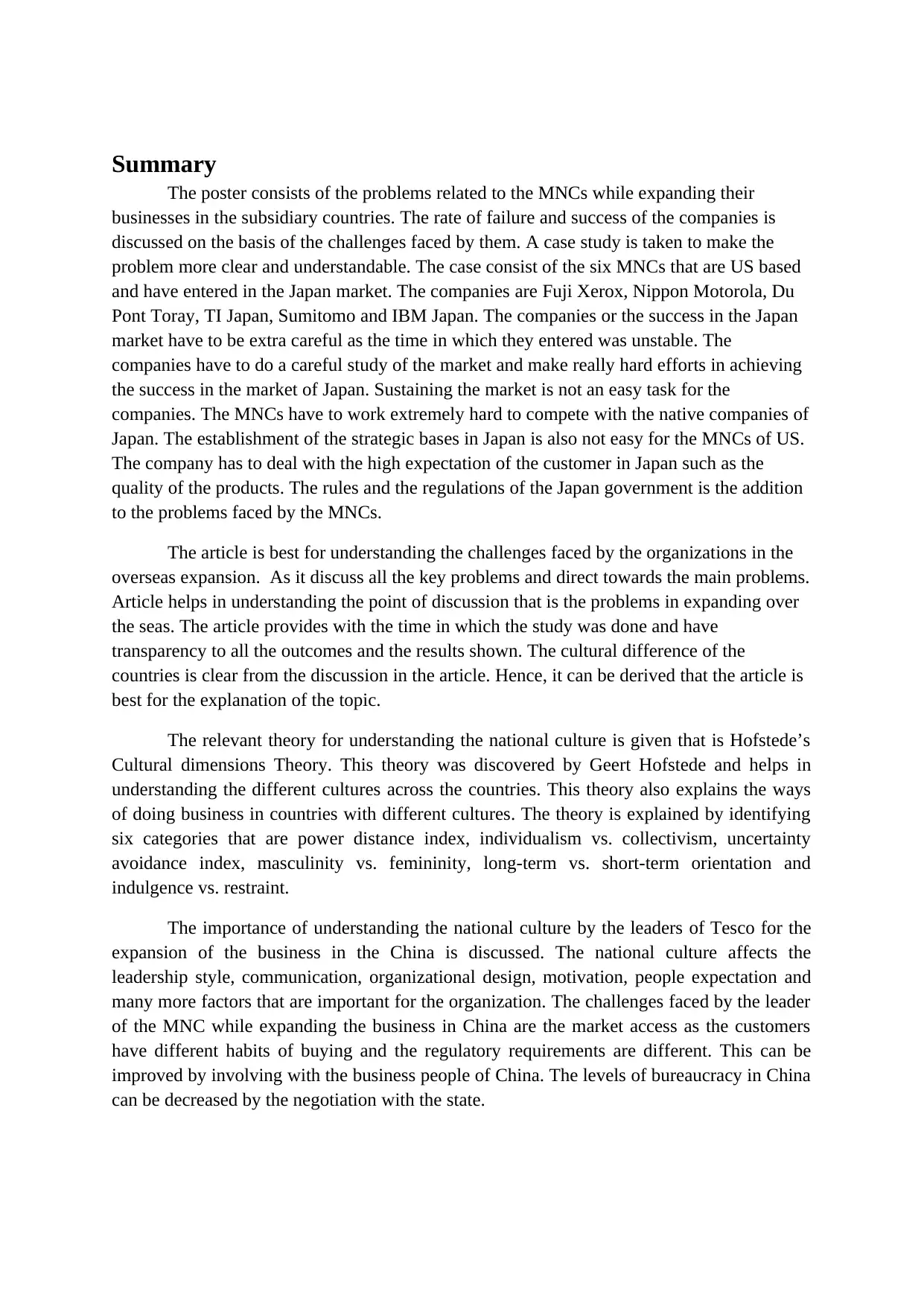
Summary
The poster consists of the problems related to the MNCs while expanding their
businesses in the subsidiary countries. The rate of failure and success of the companies is
discussed on the basis of the challenges faced by them. A case study is taken to make the
problem more clear and understandable. The case consist of the six MNCs that are US based
and have entered in the Japan market. The companies are Fuji Xerox, Nippon Motorola, Du
Pont Toray, TI Japan, Sumitomo and IBM Japan. The companies or the success in the Japan
market have to be extra careful as the time in which they entered was unstable. The
companies have to do a careful study of the market and make really hard efforts in achieving
the success in the market of Japan. Sustaining the market is not an easy task for the
companies. The MNCs have to work extremely hard to compete with the native companies of
Japan. The establishment of the strategic bases in Japan is also not easy for the MNCs of US.
The company has to deal with the high expectation of the customer in Japan such as the
quality of the products. The rules and the regulations of the Japan government is the addition
to the problems faced by the MNCs.
The article is best for understanding the challenges faced by the organizations in the
overseas expansion. As it discuss all the key problems and direct towards the main problems.
Article helps in understanding the point of discussion that is the problems in expanding over
the seas. The article provides with the time in which the study was done and have
transparency to all the outcomes and the results shown. The cultural difference of the
countries is clear from the discussion in the article. Hence, it can be derived that the article is
best for the explanation of the topic.
The relevant theory for understanding the national culture is given that is Hofstede’s
Cultural dimensions Theory. This theory was discovered by Geert Hofstede and helps in
understanding the different cultures across the countries. This theory also explains the ways
of doing business in countries with different cultures. The theory is explained by identifying
six categories that are power distance index, individualism vs. collectivism, uncertainty
avoidance index, masculinity vs. femininity, long-term vs. short-term orientation and
indulgence vs. restraint.
The importance of understanding the national culture by the leaders of Tesco for the
expansion of the business in the China is discussed. The national culture affects the
leadership style, communication, organizational design, motivation, people expectation and
many more factors that are important for the organization. The challenges faced by the leader
of the MNC while expanding the business in China are the market access as the customers
have different habits of buying and the regulatory requirements are different. This can be
improved by involving with the business people of China. The levels of bureaucracy in China
can be decreased by the negotiation with the state.
The poster consists of the problems related to the MNCs while expanding their
businesses in the subsidiary countries. The rate of failure and success of the companies is
discussed on the basis of the challenges faced by them. A case study is taken to make the
problem more clear and understandable. The case consist of the six MNCs that are US based
and have entered in the Japan market. The companies are Fuji Xerox, Nippon Motorola, Du
Pont Toray, TI Japan, Sumitomo and IBM Japan. The companies or the success in the Japan
market have to be extra careful as the time in which they entered was unstable. The
companies have to do a careful study of the market and make really hard efforts in achieving
the success in the market of Japan. Sustaining the market is not an easy task for the
companies. The MNCs have to work extremely hard to compete with the native companies of
Japan. The establishment of the strategic bases in Japan is also not easy for the MNCs of US.
The company has to deal with the high expectation of the customer in Japan such as the
quality of the products. The rules and the regulations of the Japan government is the addition
to the problems faced by the MNCs.
The article is best for understanding the challenges faced by the organizations in the
overseas expansion. As it discuss all the key problems and direct towards the main problems.
Article helps in understanding the point of discussion that is the problems in expanding over
the seas. The article provides with the time in which the study was done and have
transparency to all the outcomes and the results shown. The cultural difference of the
countries is clear from the discussion in the article. Hence, it can be derived that the article is
best for the explanation of the topic.
The relevant theory for understanding the national culture is given that is Hofstede’s
Cultural dimensions Theory. This theory was discovered by Geert Hofstede and helps in
understanding the different cultures across the countries. This theory also explains the ways
of doing business in countries with different cultures. The theory is explained by identifying
six categories that are power distance index, individualism vs. collectivism, uncertainty
avoidance index, masculinity vs. femininity, long-term vs. short-term orientation and
indulgence vs. restraint.
The importance of understanding the national culture by the leaders of Tesco for the
expansion of the business in the China is discussed. The national culture affects the
leadership style, communication, organizational design, motivation, people expectation and
many more factors that are important for the organization. The challenges faced by the leader
of the MNC while expanding the business in China are the market access as the customers
have different habits of buying and the regulatory requirements are different. This can be
improved by involving with the business people of China. The levels of bureaucracy in China
can be decreased by the negotiation with the state.
Paraphrase This Document
Need a fresh take? Get an instant paraphrase of this document with our AI Paraphraser
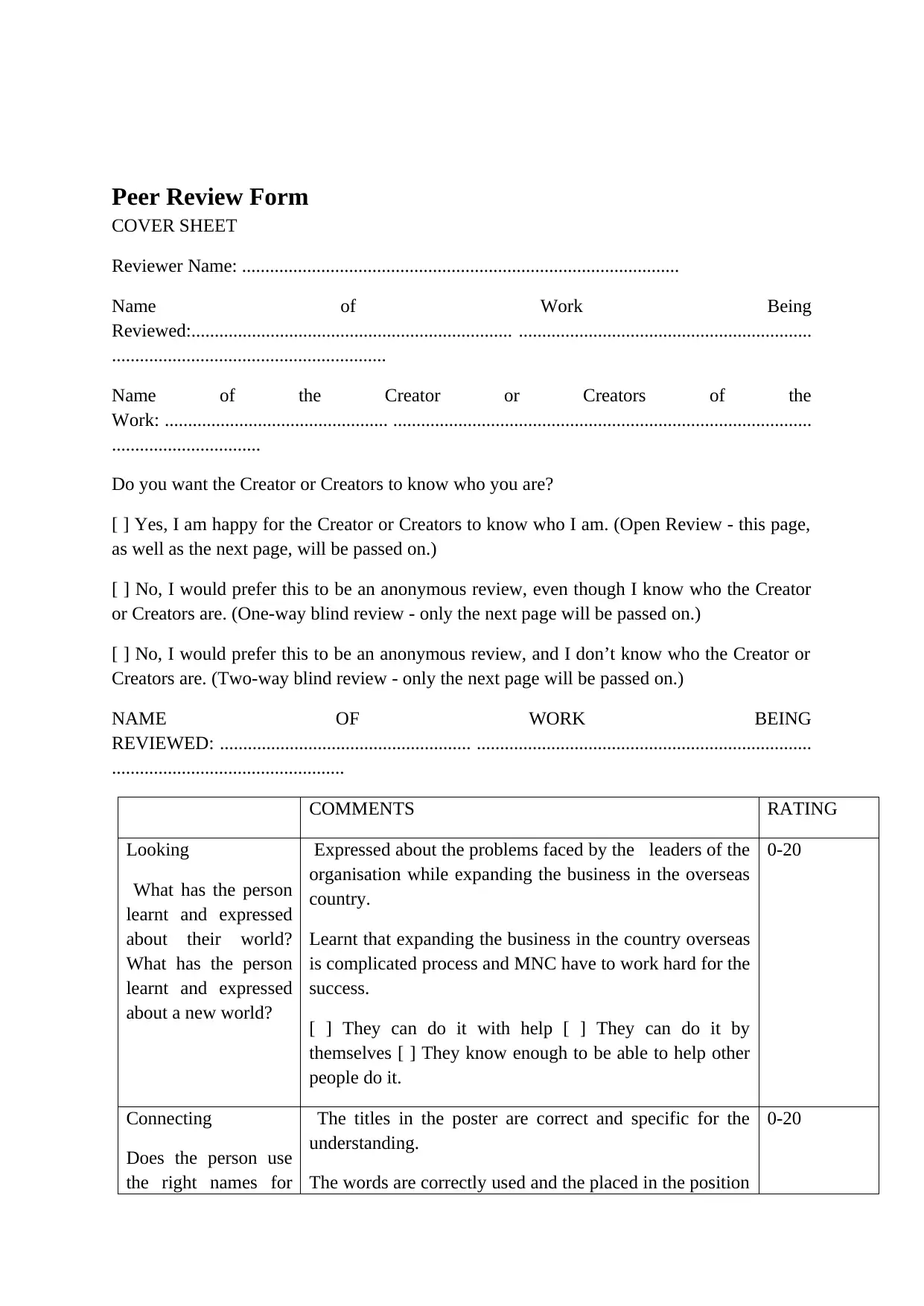
Peer Review Form
COVER SHEET
Reviewer Name: ..............................................................................................
Name of Work Being
Reviewed:..................................................................... ...............................................................
...........................................................
Name of the Creator or Creators of the
Work: ................................................ ..........................................................................................
................................
Do you want the Creator or Creators to know who you are?
[ ] Yes, I am happy for the Creator or Creators to know who I am. (Open Review - this page,
as well as the next page, will be passed on.)
[ ] No, I would prefer this to be an anonymous review, even though I know who the Creator
or Creators are. (One-way blind review - only the next page will be passed on.)
[ ] No, I would prefer this to be an anonymous review, and I don’t know who the Creator or
Creators are. (Two-way blind review - only the next page will be passed on.)
NAME OF WORK BEING
REVIEWED: ...................................................... ........................................................................
..................................................
COMMENTS RATING
Looking
What has the person
learnt and expressed
about their world?
What has the person
learnt and expressed
about a new world?
Expressed about the problems faced by the leaders of the
organisation while expanding the business in the overseas
country.
Learnt that expanding the business in the country overseas
is complicated process and MNC have to work hard for the
success.
[ ] They can do it with help [ ] They can do it by
themselves [ ] They know enough to be able to help other
people do it.
0-20
Connecting
Does the person use
the right names for
The titles in the poster are correct and specific for the
understanding.
The words are correctly used and the placed in the position
0-20
COVER SHEET
Reviewer Name: ..............................................................................................
Name of Work Being
Reviewed:..................................................................... ...............................................................
...........................................................
Name of the Creator or Creators of the
Work: ................................................ ..........................................................................................
................................
Do you want the Creator or Creators to know who you are?
[ ] Yes, I am happy for the Creator or Creators to know who I am. (Open Review - this page,
as well as the next page, will be passed on.)
[ ] No, I would prefer this to be an anonymous review, even though I know who the Creator
or Creators are. (One-way blind review - only the next page will be passed on.)
[ ] No, I would prefer this to be an anonymous review, and I don’t know who the Creator or
Creators are. (Two-way blind review - only the next page will be passed on.)
NAME OF WORK BEING
REVIEWED: ...................................................... ........................................................................
..................................................
COMMENTS RATING
Looking
What has the person
learnt and expressed
about their world?
What has the person
learnt and expressed
about a new world?
Expressed about the problems faced by the leaders of the
organisation while expanding the business in the overseas
country.
Learnt that expanding the business in the country overseas
is complicated process and MNC have to work hard for the
success.
[ ] They can do it with help [ ] They can do it by
themselves [ ] They know enough to be able to help other
people do it.
0-20
Connecting
Does the person use
the right names for
The titles in the poster are correct and specific for the
understanding.
The words are correctly used and the placed in the position
0-20
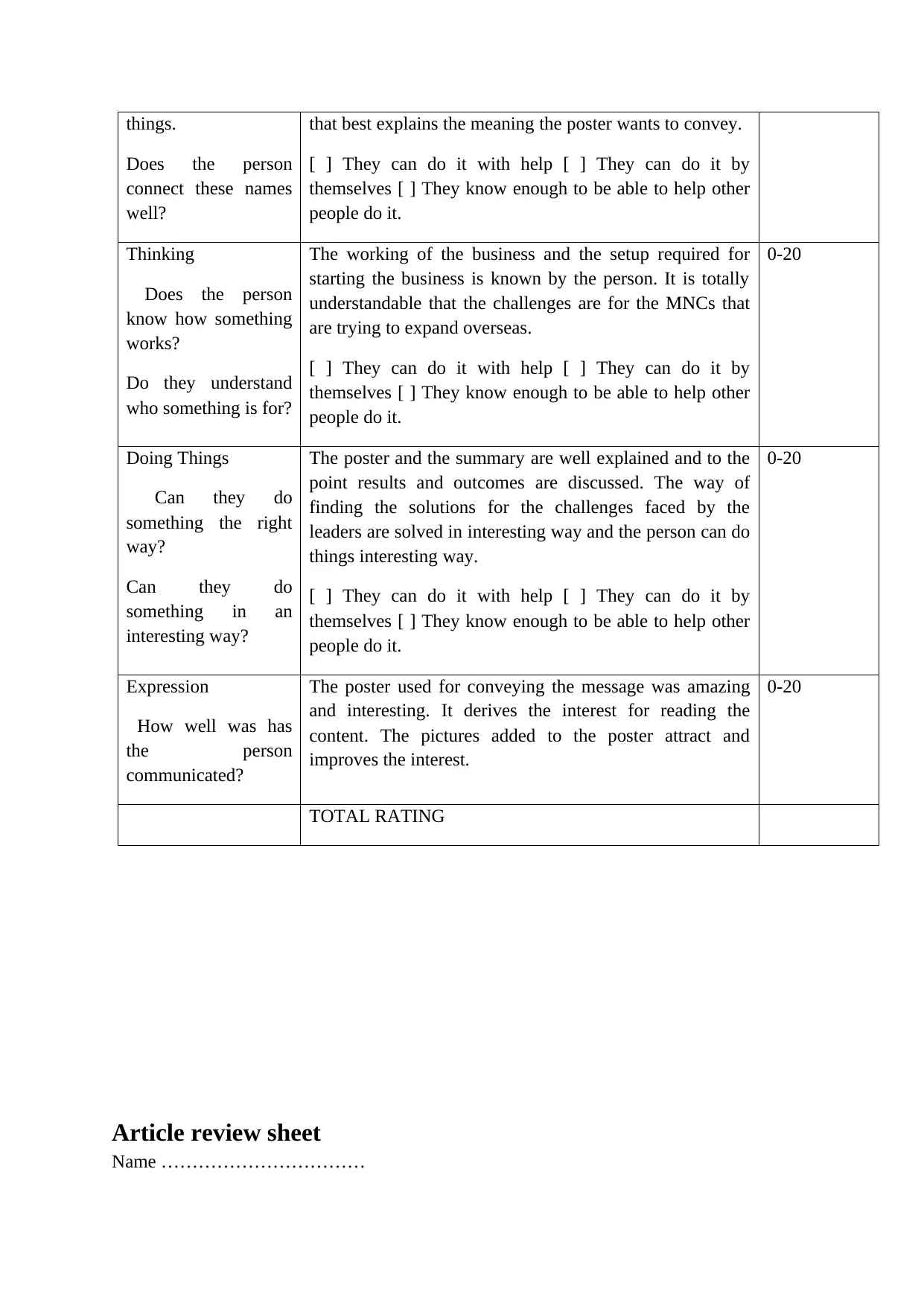
things.
Does the person
connect these names
well?
that best explains the meaning the poster wants to convey.
[ ] They can do it with help [ ] They can do it by
themselves [ ] They know enough to be able to help other
people do it.
Thinking
Does the person
know how something
works?
Do they understand
who something is for?
The working of the business and the setup required for
starting the business is known by the person. It is totally
understandable that the challenges are for the MNCs that
are trying to expand overseas.
[ ] They can do it with help [ ] They can do it by
themselves [ ] They know enough to be able to help other
people do it.
0-20
Doing Things
Can they do
something the right
way?
Can they do
something in an
interesting way?
The poster and the summary are well explained and to the
point results and outcomes are discussed. The way of
finding the solutions for the challenges faced by the
leaders are solved in interesting way and the person can do
things interesting way.
[ ] They can do it with help [ ] They can do it by
themselves [ ] They know enough to be able to help other
people do it.
0-20
Expression
How well was has
the person
communicated?
The poster used for conveying the message was amazing
and interesting. It derives the interest for reading the
content. The pictures added to the poster attract and
improves the interest.
0-20
TOTAL RATING
Article review sheet
Name ……………………………
Does the person
connect these names
well?
that best explains the meaning the poster wants to convey.
[ ] They can do it with help [ ] They can do it by
themselves [ ] They know enough to be able to help other
people do it.
Thinking
Does the person
know how something
works?
Do they understand
who something is for?
The working of the business and the setup required for
starting the business is known by the person. It is totally
understandable that the challenges are for the MNCs that
are trying to expand overseas.
[ ] They can do it with help [ ] They can do it by
themselves [ ] They know enough to be able to help other
people do it.
0-20
Doing Things
Can they do
something the right
way?
Can they do
something in an
interesting way?
The poster and the summary are well explained and to the
point results and outcomes are discussed. The way of
finding the solutions for the challenges faced by the
leaders are solved in interesting way and the person can do
things interesting way.
[ ] They can do it with help [ ] They can do it by
themselves [ ] They know enough to be able to help other
people do it.
0-20
Expression
How well was has
the person
communicated?
The poster used for conveying the message was amazing
and interesting. It derives the interest for reading the
content. The pictures added to the poster attract and
improves the interest.
0-20
TOTAL RATING
Article review sheet
Name ……………………………
⊘ This is a preview!⊘
Do you want full access?
Subscribe today to unlock all pages.

Trusted by 1+ million students worldwide
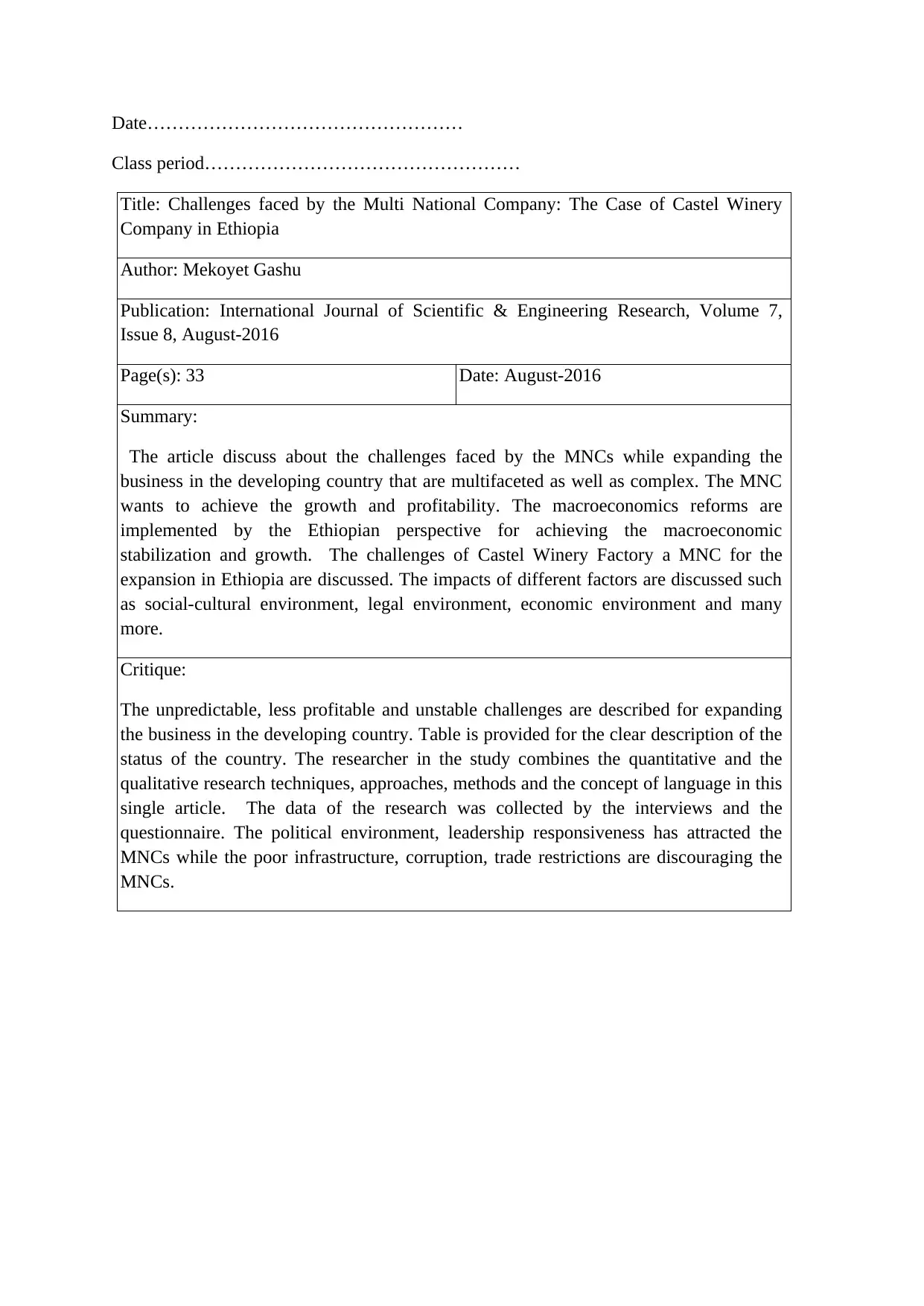
Date……………………………………………
Class period……………………………………………
Title: Challenges faced by the Multi National Company: The Case of Castel Winery
Company in Ethiopia
Author: Mekoyet Gashu
Publication: International Journal of Scientific & Engineering Research, Volume 7,
Issue 8, August-2016
Page(s): 33 Date: August-2016
Summary:
The article discuss about the challenges faced by the MNCs while expanding the
business in the developing country that are multifaceted as well as complex. The MNC
wants to achieve the growth and profitability. The macroeconomics reforms are
implemented by the Ethiopian perspective for achieving the macroeconomic
stabilization and growth. The challenges of Castel Winery Factory a MNC for the
expansion in Ethiopia are discussed. The impacts of different factors are discussed such
as social-cultural environment, legal environment, economic environment and many
more.
Critique:
The unpredictable, less profitable and unstable challenges are described for expanding
the business in the developing country. Table is provided for the clear description of the
status of the country. The researcher in the study combines the quantitative and the
qualitative research techniques, approaches, methods and the concept of language in this
single article. The data of the research was collected by the interviews and the
questionnaire. The political environment, leadership responsiveness has attracted the
MNCs while the poor infrastructure, corruption, trade restrictions are discouraging the
MNCs.
Class period……………………………………………
Title: Challenges faced by the Multi National Company: The Case of Castel Winery
Company in Ethiopia
Author: Mekoyet Gashu
Publication: International Journal of Scientific & Engineering Research, Volume 7,
Issue 8, August-2016
Page(s): 33 Date: August-2016
Summary:
The article discuss about the challenges faced by the MNCs while expanding the
business in the developing country that are multifaceted as well as complex. The MNC
wants to achieve the growth and profitability. The macroeconomics reforms are
implemented by the Ethiopian perspective for achieving the macroeconomic
stabilization and growth. The challenges of Castel Winery Factory a MNC for the
expansion in Ethiopia are discussed. The impacts of different factors are discussed such
as social-cultural environment, legal environment, economic environment and many
more.
Critique:
The unpredictable, less profitable and unstable challenges are described for expanding
the business in the developing country. Table is provided for the clear description of the
status of the country. The researcher in the study combines the quantitative and the
qualitative research techniques, approaches, methods and the concept of language in this
single article. The data of the research was collected by the interviews and the
questionnaire. The political environment, leadership responsiveness has attracted the
MNCs while the poor infrastructure, corruption, trade restrictions are discouraging the
MNCs.
Paraphrase This Document
Need a fresh take? Get an instant paraphrase of this document with our AI Paraphraser
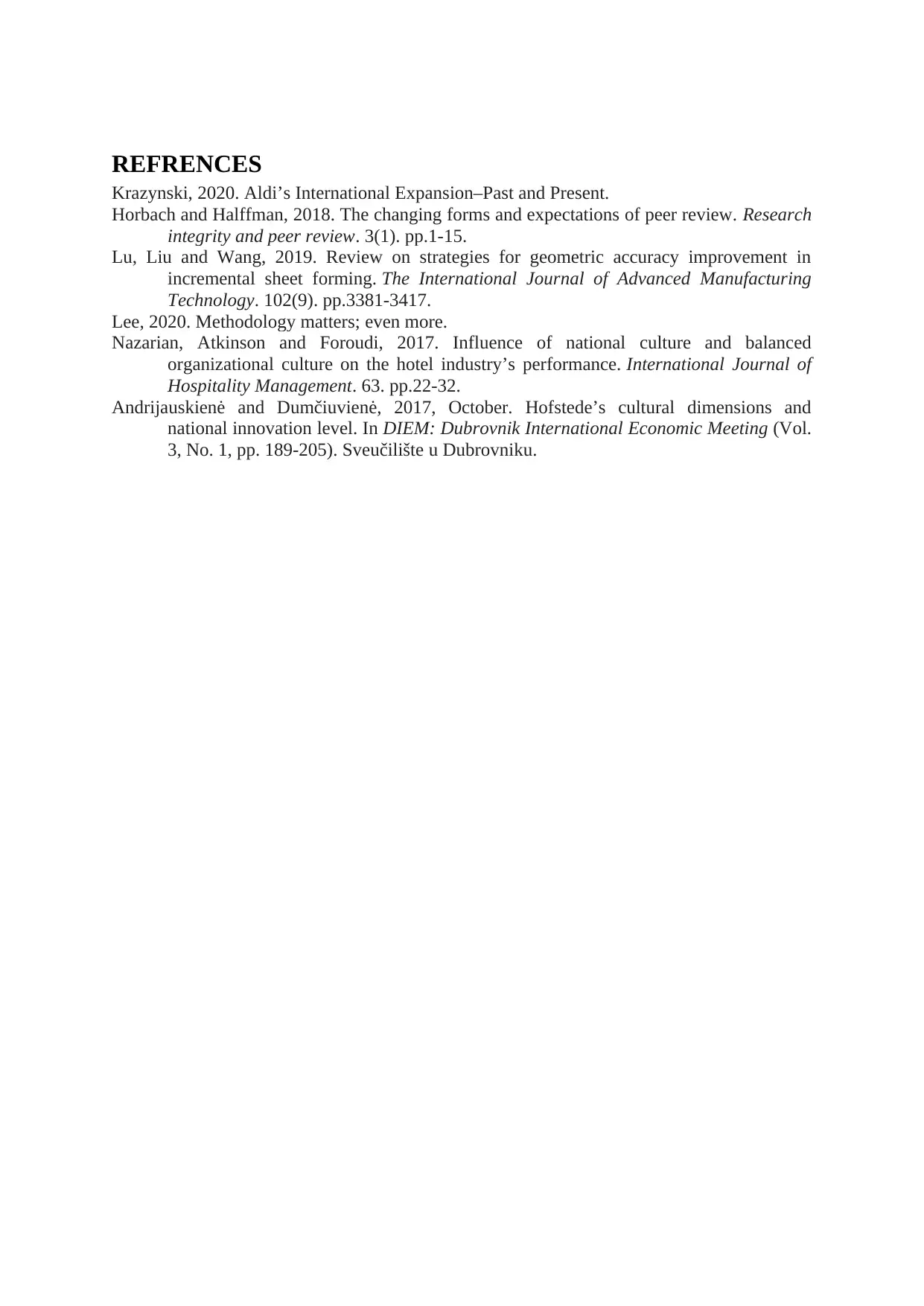
REFRENCES
Krazynski, 2020. Aldi’s International Expansion–Past and Present.
Horbach and Halffman, 2018. The changing forms and expectations of peer review. Research
integrity and peer review. 3(1). pp.1-15.
Lu, Liu and Wang, 2019. Review on strategies for geometric accuracy improvement in
incremental sheet forming. The International Journal of Advanced Manufacturing
Technology. 102(9). pp.3381-3417.
Lee, 2020. Methodology matters; even more.
Nazarian, Atkinson and Foroudi, 2017. Influence of national culture and balanced
organizational culture on the hotel industry’s performance. International Journal of
Hospitality Management. 63. pp.22-32.
Andrijauskienė and Dumčiuvienė, 2017, October. Hofstede’s cultural dimensions and
national innovation level. In DIEM: Dubrovnik International Economic Meeting (Vol.
3, No. 1, pp. 189-205). Sveučilište u Dubrovniku.
Krazynski, 2020. Aldi’s International Expansion–Past and Present.
Horbach and Halffman, 2018. The changing forms and expectations of peer review. Research
integrity and peer review. 3(1). pp.1-15.
Lu, Liu and Wang, 2019. Review on strategies for geometric accuracy improvement in
incremental sheet forming. The International Journal of Advanced Manufacturing
Technology. 102(9). pp.3381-3417.
Lee, 2020. Methodology matters; even more.
Nazarian, Atkinson and Foroudi, 2017. Influence of national culture and balanced
organizational culture on the hotel industry’s performance. International Journal of
Hospitality Management. 63. pp.22-32.
Andrijauskienė and Dumčiuvienė, 2017, October. Hofstede’s cultural dimensions and
national innovation level. In DIEM: Dubrovnik International Economic Meeting (Vol.
3, No. 1, pp. 189-205). Sveučilište u Dubrovniku.

⊘ This is a preview!⊘
Do you want full access?
Subscribe today to unlock all pages.

Trusted by 1+ million students worldwide
1 out of 13
Related Documents
Your All-in-One AI-Powered Toolkit for Academic Success.
+13062052269
info@desklib.com
Available 24*7 on WhatsApp / Email
![[object Object]](/_next/static/media/star-bottom.7253800d.svg)
Unlock your academic potential
Copyright © 2020–2025 A2Z Services. All Rights Reserved. Developed and managed by ZUCOL.





